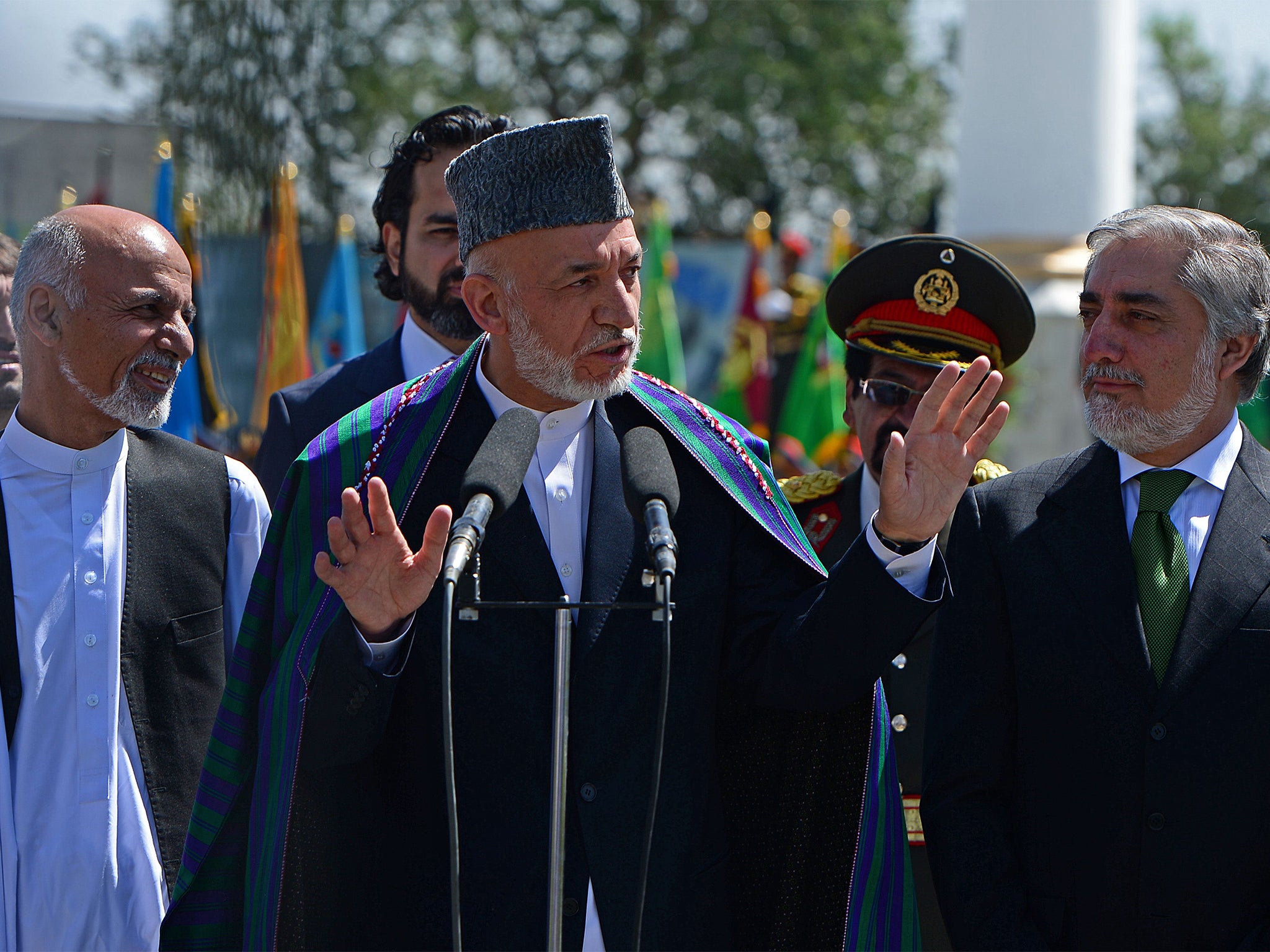Afghanistan presidential elections: Nervous citizens fear return to violence amid ballot deadlock
Threats to form a 'parallel government' and calls for a 'civil uprising' have followed the disputed poll

With a crucial deadline for the inauguration of a new president approaching, and an election ballot recount at a critical stage, fears are growing that Afghanistan’s fragile transition process could collapse into violence.
The quickening pace of the protracted election audit and a flurry of meetings between aides to the two rival candidates this week have raised faint hopes that the country may have a new leader in office within two weeks, just in time to attend a Nato summit crucial to future foreign aid for Afghanistan.
But Afghan and international observers warn that the process could easily fall apart, with disputes persisting over the fairness of the ballot recount and the two candidates unable to agree on a division of power after a winner is declared. Under US pressure, they agreed to form a national unity government with a president as well as a chief executive, but they differ strongly on the details.
Despite pleas for patience from international officials, aides and allies of Abdullah Abdullah – the candidate who originally called for the ballot recount and charged massive fraud in a June runoff vote against rival Ashraf Ghani – continue to threaten that they will pull out of the process and call for civil unrest if Mr Ghani wins a tainted recount and is named president.
One powerful governor backing Mr Abdullah threatened in June to form a “parallel government” after Mr Abdullah lost the runoff, and last week he again called for a “civil uprising” and takeover of the capital if Mr Abdullah loses the vote recount. There have been separate news reports that some officials close to the Afghan security services may be planning to install their own “interim government” if the political process falls apart.
Over the past few days, police and security vehicles have flooded the capital, Kabul, and sporadic gunfire has been heard. On Tuesday, a knife fight reportedly broke out at the heavily guarded election compound where the votes are being recounted, injuring several people.
Although both candidates have signed a commitment to form a joint government as soon as the recount results declare one of them president, negotiating teams for Mr Ghani and Mr Abdullah are apparently still miles apart on how much power and authority the loser would be able to exercise as chief executive, a critical factor in dispensing patronage to powerful backers and allies.
Uncertainty over what will happen in the next two weeks – whether Afghanistan will manage to install a new government or face violent challenges from forces unwilling to accept electoral defeat – is gripping a nation that has gambled its future on a deeply flawed first-ever democratic transition of power. “Afghanistan is very fragile and unstable. We are right at the edge of making or destroying all the hopes that the people have for new leadership and a credible government,” said Abbas Noyan, a spokesman for Mr Ghani. “Former adversaries need to become partners, but we have enemies on all sides, from the hardliners to the Taliban. If violence starts, a lot of people will be killed before it can be stopped.”
Mr Ghani, a former World Bank official, won the June runoff by a wide margin over Mr Abdullah, a former foreign minister, and is likely to prevail in the recount. Mr Abdullah, who garnered the most votes among 16 candidates in a first round in April, has alleged that both the runoff and the recount have been fraudulently stacked against him by Mr Ghani and the outgoing government of President Hamid Karzai.
The deadline to install a new president by the end of the month is more symbolic than legal, since the original inauguration date slipped by several weeks ago. But with a Nato summit in early September and a much-delayed US-Afghan security agreement awaiting a new president’s signature, the future of Western economic and military support for Afghanistan hangs in the balance.
Mr Karzai, who has led Afghanistan for more than a decade since the overthrow of the Taliban regime, now says he intends to leave office by the end of the month, raising the prospect of a prolonged power vacuum if no one is confirmed to replace him. Nato leaders have said they will have to start plans to withdraw all forces from Afghanistan if the security agreement is not signed soon.
Until recently, the ambitious, UN-supervised audit had been slowed by technical problems and constant disagreements between the two sides. In the past week it has picked up considerable speed, but it is about to enter a new, highly politicized phase. Election officials plan to announce partial results, which could unleash a frenzy of accusations and ultimatums from both camps.
© Washington Post
Join our commenting forum
Join thought-provoking conversations, follow other Independent readers and see their replies
Comments